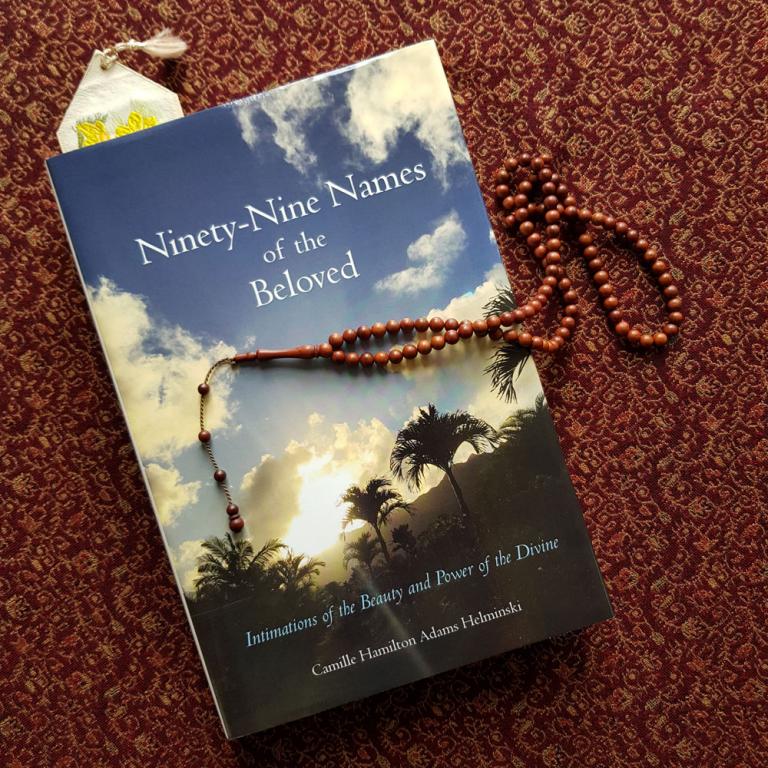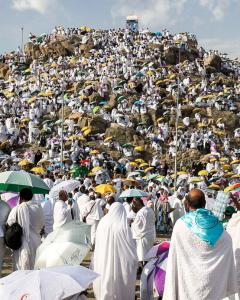
I have written previously about my fasting challenges and how I try to focus on other aspects of Ramadan to deepen in the blessings this month offers. Last Ramadan I took an online course on the Ninety-Nine Names of God. There was an over-abundance of material that the teachers supplied, and I decided to revisit the e-course this Ramadan to deepen in my reflections of the Divine Names.
The main text used in the e-course is the Ninety- Names of the Beloved: Intimations of the Beauty and Power of the Divine by Camille Hamilton Adams Helminski. These poetic reflections on the Divine Names have been my daily companion for the last year. Each Name of God is explored in exquisite beauty that connects us to the sublime and mundane of everyday life. And each Name comes with accompanying Qur’anic verses that speak to the qualities evoked by the Name.
I have been studying the Names of God for many years now, but nothing has connected me to the imminent beauty of God and creation like this book. Each poem is a teaching in and of itself. Truth be told, my previous two articles began as an attempt to review this book, but each time I found my pen unable to articulate the awesomeness I felt and my musings were rendered in different avenues of expression. And so I start again, in the Name of God, with the Name of God…
Say: “Call upon God, or call upon the Infinitely Compassionate:
by whichever name you invoke Him/Her,
His/Hers are all the Most Beautiful Names.”
[17:110]
And in the beginning there is Ar Rahman, the Infinitely Compassionate One, and Ar Rahim, the Infinitely Merciful One:
O You Who Are Infinite Compassion,
Infinite Mercy,
how could we conceive
of the vastness of Your Love?
We are told that God’s love is limitless, and yet I know I struggle to imagine that depth of love; God loves us more than our parents, but yet we are still unable to conceive of the vastness of that Love. I find as I meditate on this line that my inner landscape expands and I get an inkling of the vast spaciousness of God’s infinite compassion and mercy gently holding me as I float along, sometimes with awareness, sometimes oblivious – and yet that vast loving is always present.
Every day you nourish us,
every day You support our limbs
as we move through this space
You have given us;
and those whose portion
has become stillness,
still, inwardly, may travel vast distances.
One of the most striking things about the book for me is how all the poems seem to contain and balance a mixture of bittersweet pain and joyful healing. My own experience with chronic illness finds eloquent reflection in these poems. While our human difficulties are acknowledged, we are still guided to the way we can reconnect – amidst the difficulty – to the beauty and blessing that is on offer; that even if we cannot walk physically through this world, we can still open our inner eye and travel in more subtle and mysterious ways. This encapsulates my Ramadan journey, as my body is unable to physically engage in the material fast, I can still ‘travel vast distances’ as I deepen in my salah, zhikr, Qur’an reading…
Your Sun shines each day upon us all,
whether in remembrance
or forgetfulness,
Your Compassion holds our hearts
and would inform us
if we would but pause
to receive Your Knowledge—
The reminders to remember are numerous throughout the poems and a clear sign of my habitual tendency to forget the Divine – even in the act of remembrance. Maintaining presence during prayer can sometimes be a challenge for me, but the Compassionate Sun shines on me nevertheless – just waiting to guide me if I would just pause and open. The elements in these poems blend together to create an all-encompassing experience of the Divine Attributes…
and the rains come pouring
into these hearts
when we have opened
in thirst these throats
ready to receive Your Mercy,
clear water for those who are longing.
The sweet delight of that first sip of water at iftar – nothing matches how delicious pure water tastes when you have been without it all day. These lines draw me to the deeper meaning of spiritual thirst and how we are constantly being called to open ourselves to the water of mercy that is continually flowing to and around us.
You return us to our origin—
and everything was created from water—
Your Mercy comes to know Itself in us,
until Rahman is seated upon the throne of the heart,
so that the radiance of that Sunshine
might fill these fragile bones
with strength from the depths
and the heights
of Your Loving,
Like the drop that contains the sea, we are from water and we can return to that ocean of mercy in every moment. And through this returning, my body is strengthened through this awesome Love.
And the poem ends with:
that like the Prophet Muhammad
we might, also,
become “a mercy to the worlds.”
For, Truly, those who have faith
and do the deeds of wholeness and healing
the Infinitely Compassionate will endow with love.
A beautiful invitation to connect me to the spirit of the Prophet Muhammad, affirming that I can also try to embody his qualities in my life.
Out of the Qur’anic selections offered with these Names, the following struck me as incredible:
Your Sustainer has willed upon Himself/Herself
the law of Compassion and Mercy.
[6:54]
That God would choose to abide by a law is in itself surprising, but that the law would be enforced by these two Names is astonishing and once again shows me a loving, tender Creator whom I wish I had met in childhood. But I am so very grateful that I have come to know my Sustainer, finally, in such a sublime and intimate way. The author opens the book with the following words:
The Divine is so generous with the qualities of Being that in any moment they may be perceived in new ways, in varied intermingled resonances, with different hues, to touch our hearts and minds and souls and bodies, and awaken us in awe. God willing (Inshallah), more windows and doors might open every day for us to witness the Beauty and Magnificence of this Creation, both outwardly and inwardly, bestowed by that One who continually sustains us in every moment, with such an immense outpouring and in-pouring of Love.
These reflections are indeed full of varied intermingled resonances that have connected the transcendent to the immanent for me, and now, wheresoever I turn there is the Face of God [2:115].
Subhanallah ~ Glory be to God!












